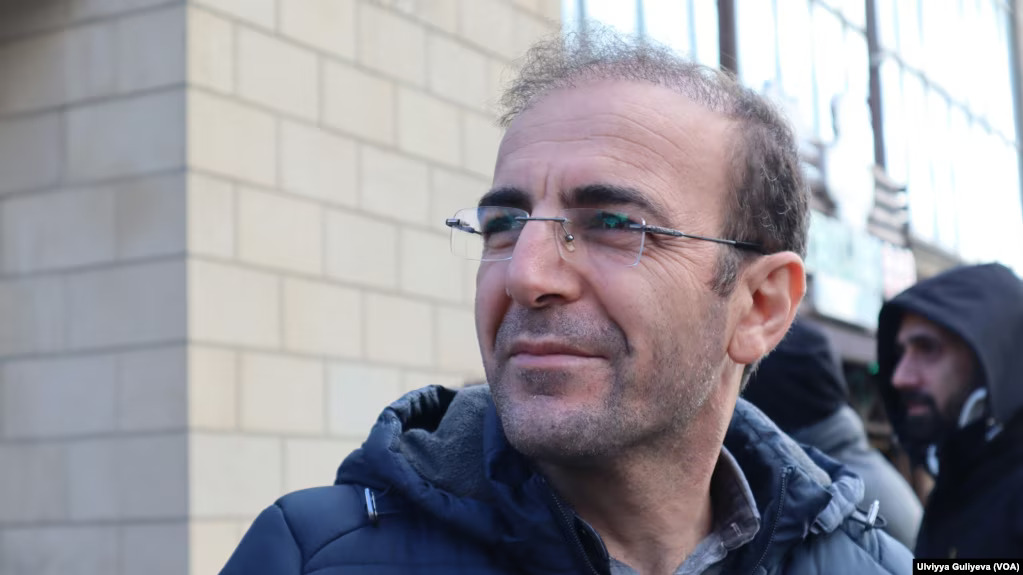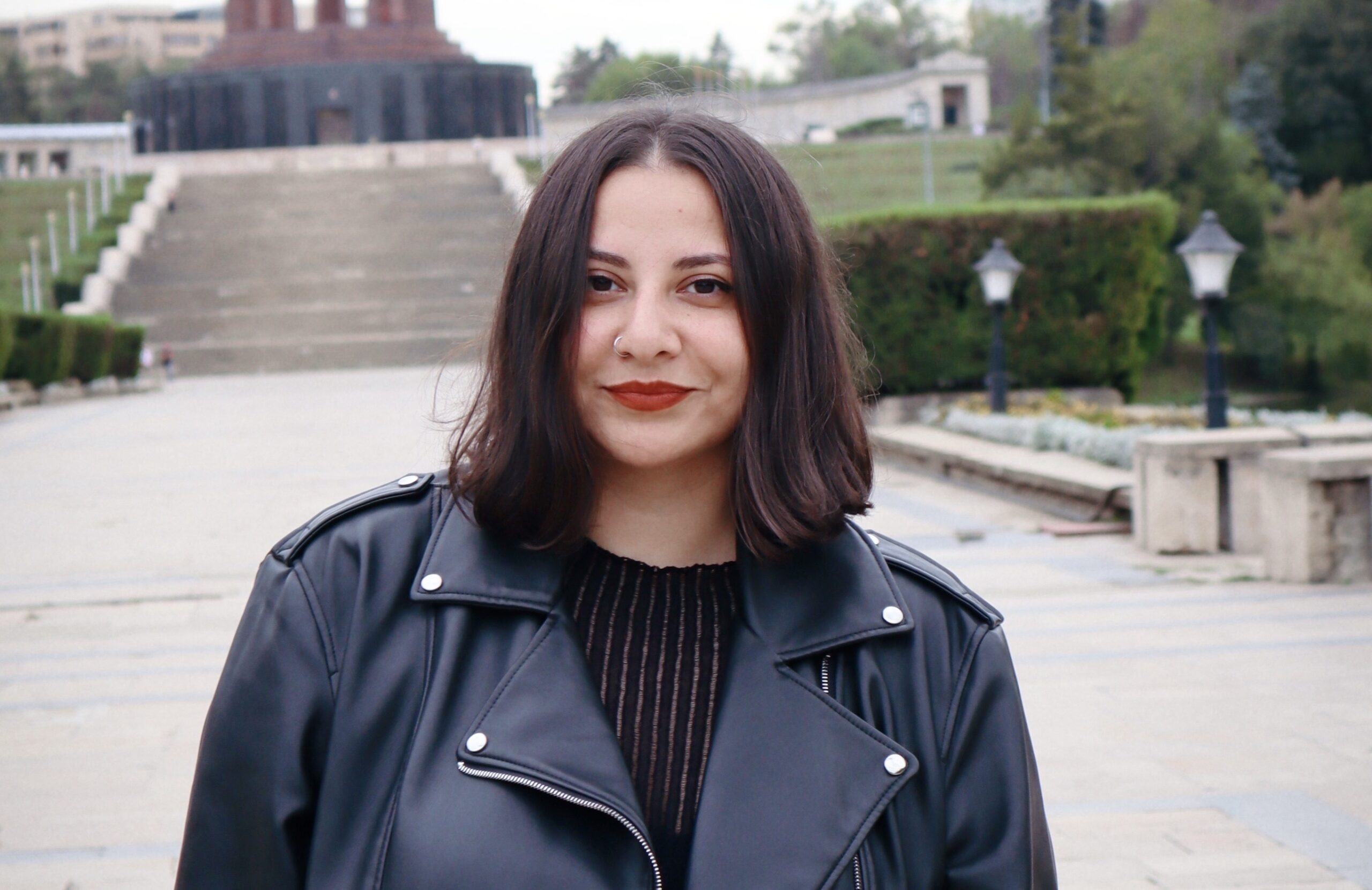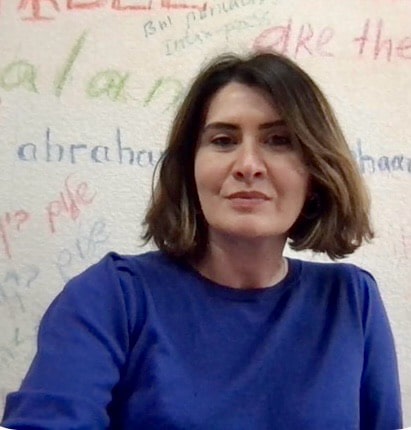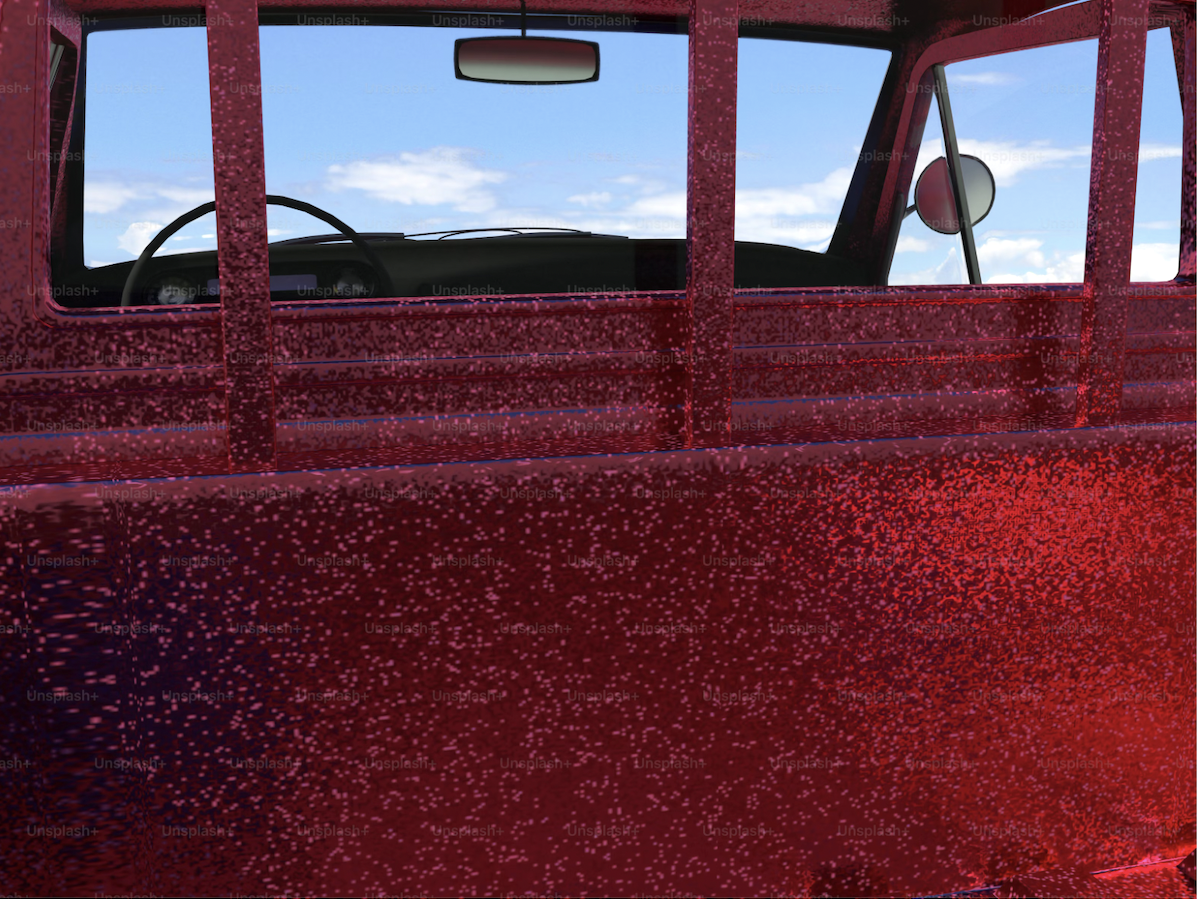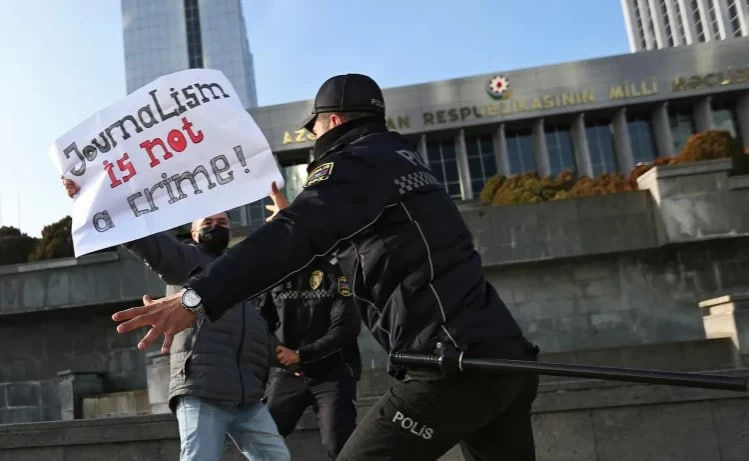Being a journalist in Azerbaijan: the story of the detention of Ulviyya Ali, Voice of America reporter
“I want everyone to know that within one day I was threatened with rape twice by Azerbaijani police.”
This article is dedicated to the letter from journalist Ulviyya Ali, who was arrested in connection with the “Meydan TV case.” Her story is not just about detention and false accusations. It is a portrait of the repression and violence faced by independent media in Azerbaijan.
Ulviyya Ali (Guliyeva) was violently detained on the night of May 7 by officers of the Baku Main Police Department as part of the “Meydan TV case.” Her home was searched. On the same day, the Khatai District Court ordered her pretrial detention for one month and 29 days.
On December 6, 2024, Meydan TV employees Ramin Deko (Jabrailzade), Aynur Ganbarova (Elgunesh), Aysel Umudova, Aytaj Akhmedova (Tapdig), Khayala Aghayeva, and Natig Javadly were arrested in connection with the case. Like Ulviyya, they face charges under Article 206.3.2 of the Criminal Code -smuggling committed by a group of persons in prior conspiracy. All the journalists deny the charges and claim they were arrested for their critical reporting of the authorities.
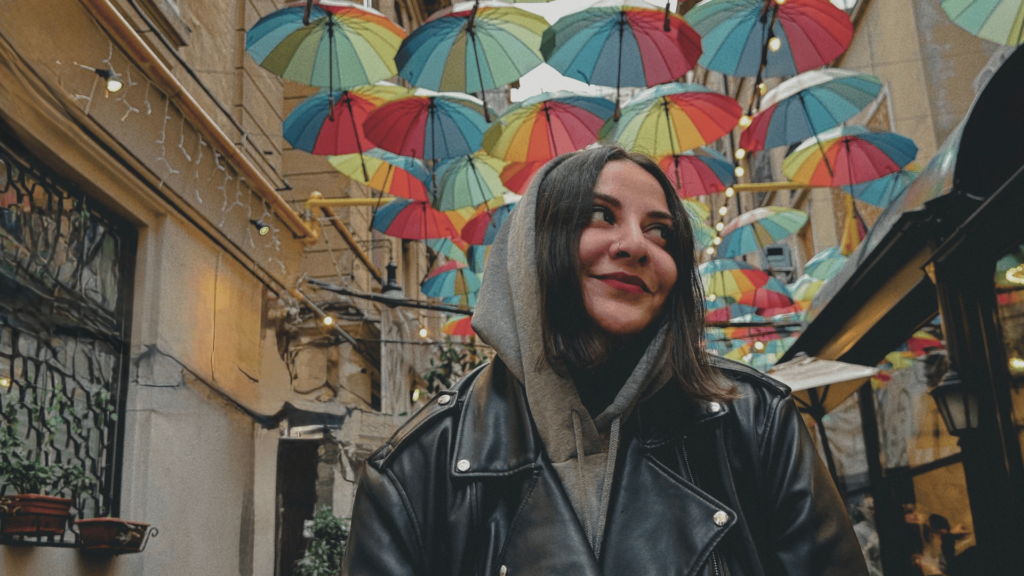
As Ulviyya Ali writes in her letter, the events that happened to her after she filmed court hearings on the same day for the cases of Tofiq Yaqublu and Abzas Media.
Sometimes the experience of one person is enough to understand how an entire system works. This is exactly such a story.
We publish Ulviyya Ali’s letter in full.
How was I detained
On May 6, I was filming court hearings for the cases of Tofiq Yaqublu and Abzas Media, then shared the information on my profile. After Voice of America closed, I lost my job, but on my profile I wrote that even without an official workplace, I would not stop my journalism.
All posts on my profile were done completely voluntarily. Yet the state supposedly “worries” most about someone receiving funding from “Western circles.” By continuing my work this way, I completely destroyed their argument and showed that it’s not about money.
Late at night, around midnight on May 6, as I was entering my apartment building, a man approached me. That day, after the Abzas Media hearing, I stopped at a café to rest a bit and noticed someone watching me from a window – a man in civilian clothes was following me from across the street.
The man who approached me at the entrance asked, “Ulviyya?”
I already understood that my turn had come – they had come to detain me too.
He reached for my phone, and without protest, I handed it over. They put me into a car, checked if I had a watch on my wrist. While searching my bag, they found my old phone and house keys.
They demanded the passwords to my phone, but I refused. Next to me sat a large police officer, opposite me was investigator Alibala Hajiyev, the driver was behind the wheel, and another police officer sat beside him.
The car started moving; I looked out the window, trying to guess where they were taking me. After 2–3 minutes of driving in circles, we returned to my house. Seven police officers entered the building, along with me and the investigator.
When I reached the door, I inserted the key. I was relieved – my roommate was home and had locked the door from the inside. Without wasting time, I shouted, “I’ve been detained, tell someone!” At that moment, the same large police officer covered my mouth with his big hand.
For a moment, I felt like I was suffocating – his palm was so large it covered my nose as well.
Fists began pounding furiously on the door, and it was kicked hard. Even the neighbor downstairs heard the noise and asked, “What’s going on?” They replied, “Come inside.”
After 1–2 minutes, my roommate opened the door. Everyone rushed into the apartment. They showed me the search warrant. It stated that I was detained as a suspect in the case of “Aynur Gyanbarova and others.”
Yes, it was about the high-profile Meydan TV case, in which I was detained as a suspect.
I read the warrant and smiled again. Because everyone knows: since 2019, I have worked with Voice of America, not Meydan TV. If ten people were falsely accused in this case, then I, the eleventh, was falsely accused twice as much.
Yes, most of the detainees are my friends. Yes, I protested their unfair arrest. If I had really worked for Meydan TV, I would say so proudly, not deny it!
Search and “the operation of planting money”
First, we went into the living room. The police scattered like bees throughout the rooms. In the living room, they took a 32 GB flash drive from the cabinet, a DVD of my 11th-grade graduation, and a disc with a recording of my medical operation. There were seven police officers, two witnesses, the investigator, me, and my roommate in the apartment.
I have two cats, and out of fear, they climbed up onto the cabinet. From time to time, I looked back at them – it was clear how stressed they were.
After the living room, we went to the bedroom. They turned my things upside down. From my room, they took a memory card from a camera, a flash drive, and a laptop. They also seized my roommate’s computer and phone, who has no connection to politics. The other police officers inspected the bathroom and kitchen.
After a while, we went into the third room, which didn’t have any of my things, only belongings of my former roommate remained there. They found nothing.
When I complained about the search, one of the witnesses said in Russian, “You are being too fussy.” I replied: “I didn’t invite you into my home. You came into my house without permission or invitation. You can leave.”
Then we returned to the living room. Investigator Alibala Gadzhiev began entering the seized items into the protocol. I was surprised and thought, “Could it be that they didn’t plant money in my house?!” So, ironically, I said, “You aren’t going to plant money, are you?”
One of the plainclothes officers immediately jumped up and said, “Whose house did we plant money in?” I replied, “I’m not talking to you; I asked the investigator.” He said, “I’ll plant some now, you’ll see.” I shot back, “That’s the best thing you’re capable of.”
While my roommate, the witnesses, five police officers, and I were in the living room, two officers – one in plain clothes, one in uniform – stayed near my bedroom. I asked the investigator, “What are they doing there?” The investigator replied, “The protocol is already drawn up; their presence in the next room doesn’t matter.”
I objected again, and the investigator called them back. About 10 minutes later, both returned to the living room. One immediately went out to the balcony to smoke. Who he called or what he said – I don’t know.
During the protocol drafting, I noticed a police officer who frequently went in and out of the house nodded to the investigator from across the room. Suddenly, a 40–45-year-old officer who barely took part in the search said, “We didn’t look on top of the cabinet in the bedroom.”
I was given a guard – a large police officer who mimicked my every move whenever I began to shift or turn and was always ready.
We went back to the bedroom, and they began pulling things down from the top of the cabinet. From the top pocket of my suitcase, which I hadn’t opened or even looked at since January 4 this year, they pulled out a bundle of money about the thickness of Chekhov’s book Ward No. 6.
They handed me the money and asked, “Whose money is this?” I didn’t touch it and laughed loudly: “You know better since you planted it.”
No, I wasn’t the one reminding them about the money. I knew they were fussing around to plant money in the house.
We returned to the living room to finalize the protocol. That police officer said, “See, I told you I’d plant something.” I applauded and said, “I liked your performance.”
In the protocol, I noted that the search in my home took place without my lawyer present, the door should have been locked, but police kept coming in and out, the investigator counted the money without gloves, the large police officer used violence by covering my mouth, and so on.
But the violence against me didn’t end there.
Another point: the witnesses showed no interest in the investigation – when the search was happening in the right part of the house, they stayed in the left.
They were so indifferent that one signed the protocol before it was finished and left, while the other said he had a sick person at home and also left.
So only the police, my roommate, and I remained.
Only 4–5 lines were allocated for my comments in the protocol, even though the search and seizure were conducted with such blatant violations that they couldn’t be summarized in just a few lines.
My roommate wasn’t allowed to take any notes at all. Both of us were forced to sign the protocol, although my roommate wasn’t even allowed to move. Searching a room with 11 people doesn’t make sense, so she wasn’t allowed into the bedroom and didn’t see any of the items seized.
The money they planted and took – the exact amount of which we never determined – my roommate only saw when the investigator counted it without gloves. But even my notes were left out of the protocol, so her remarks could not be included either.
When the witnesses left, the police officer who planted the money said, “Thanks, dear.” I never understood whom he meant.
After the protocols were completed, I called my cats by name. They came down from the top of the cabinet. I kissed them, hugged them, and fed them, filling their bowl very full.
Because I already knew I wouldn’t be coming back home.
A gift from me to the police
My roommate and I were taken in separate cars to the Main Police Department of Baku. I kept asking about her because I was very worried about the detention of someone completely unrelated to politics — so much so that I barely noticed my own detention.
When we arrived at the department, they took us to different rooms. Four uniformed officers and one plainclothes man entered my room. I think his name was Hasan. He wore a mask that barely showed his face. But that didn’t matter — this thin man liked his own voice so much that he shouted at me at full volume.
He sat across from me at the table, staring into my face, almost crowding me. He slammed a water bottle on the table, spilling water on me and the table. He demanded the passwords to my phones and computer, but I refused to give them.
Turning to the other officers watching, I said, “Take him away from me.” They calmly asked me to give the passwords and promised everything would be fine. I kept refusing. At that moment, the thin officer who liked shouting at women left the room.
The plainclothes man, meanwhile, enjoyed the moment, smoking a cigarette. He said, “Give us the passwords.” I asked, “Who are you?” He answered, “A utility worker. Something could happen to you that you can’t even imagine, and we won’t stop it.”
Beating
Then a loud-voiced policeman came back, and I gave other passwords. He stood over me, leaning down. The officer writing down the passwords left the room, returned after 1–2 minutes, and said the passwords were incorrect.
At that moment, the thin policeman standing over me started punching me in the head – every time I said “I don’t know,” he hit my head. In total, he punched me five times on the back of the head, twice in the middle of the head. Twice he poked me in the temple with his finger.
Seeing that I didn’t give in, the policeman who had been smoking with pleasure, introducing himself as a “utility worker,” stood up, and two policemen from opposite sides grabbed me by the hair, pulling it in different directions.
The thin policeman said, “Bring the taser.” Something was brought and placed on the table. When I refused again, the thin policeman said, “I will violate your woman’s honor.” Those words made my heart sink.
We have long seen and heard what Azerbaijani police are capable of. The Azerbaijani police fabricate cases, beat people, and commit illegal acts.
It turns out the Azerbaijani police can openly say they will slander and assault a woman.
In 2017, I had a brain microadenoma. The tumor was benign and located near the pituitary gland. After long treatment, the tumor disappeared, but I undergo yearly checkups for monitoring. I have numerous medical reports, MRIs, and other tests.
Since the blows to my head, I have dull headaches as well as nausea and vomiting.
When opposition members are detained, their illnesses are often noted. In one comment, I read someone wrote, “It seems like all these opposition members are sick with something.”
Yes, comrades from the police, it’s not only opposition-minded people – everyone suffers under mistreatment.
On the computer they took from my home, it says A.C.A.B. (All Cops Are Bastards). It gives me satisfaction to know that every time he turned on my computer, that message lit up right in his face. That’s the most accurate response to everything that happened.
Investigator Alibala: “I didn’t see any violence”
There may not have been 40 assailants, but five people witnessed everything, and I was once again handed over to the large police officer. Honestly, I thought he would be the one to use violence, but he wasn’t in the room, didn’t interfere, and behaved comparatively more respectfully.
They brought me to the office of Investigator Alibala Gadjiev. I said, “I was subjected to violence.” He replied, “I didn’t see that.” I wasn’t saying it hoping for his help – as if he had no idea what was happening?! After those threats, I just wanted to see the expression on his face.
They know very well that I have no ties to Meydan TV, but since they needed “evidence” and didn’t have any, they used violence to try to extract my passwords. As far as I know, no violence was used against any of the women detained before me to obtain passwords.
Their goal was to fabricate “evidence” against me out of nothing. I suppose they would have latched onto messages like “Hi, how are you?”
When the formal procedures began, I asked for my lawyer. They told me it was already late and that only a state-appointed lawyer was available.
I asked to call Zibeyda Sadigova, whose number was the only one I had. They called her, and she said she could only come in the morning with a warrant.
I informed the state-appointed lawyer about the violence I had endured. He – a lawyer named Sevdiyar Bayramov – didn’t respond. But I repeated that my procedural rights had been violated and that I had been subjected to violence.
I also demanded that he record that my detention was politically motivated and connected to my work as a journalist.
Smuggling: “Are you a journalist?”
The decision to detain me as a suspect was issued for May 7, 2025. But I was arrested on May 6. The detention order was signed by the well-known investigator Samir Ismayilov. I had always remembered May 6 as the execution date of Deniz Gezmiş (a leader of the Turkish student movement). After this, that date also became connected to my own fate.
After the formalities were completed, I was taken to the Temporary Detention Facility in the Khatai district. There they asked for my charge. I replied: “Smuggling.” The man asked: “So, you’re a journalist?” I smiled and said, “Yes!”
Another guy in the facility, whom I didn’t know, also asked: “Are you a journalist?” I said, “Yes.” He replied: “I’ve heard your voice on Voice of America.”
I said I’d heard it there too, but now I was “together with others on the maidan (a square), and in prison” (a well-known slogan used by the journalists of Meydan TV).
Still, it made me happy that my voice had reached the heart of the system.
I didn’t sleep all night. It was around six in the morning, and my eyelids were heavy from exhaustion.
After the registration process, they placed me in cell number 6. Later I found out that before me, this cell had held Aynur Elgyunesh (editor-in-chief of Meydan TV, currently under arrest). The fact that I ended up in cell number six made me think of the story “Ward No. 6,” and I smiled to myself again.
But it was impossible to fall asleep – the pain in my head was relentless. On top of that, I felt nauseated. I vomited twice before morning. I don’t know whether it was from the blows to my head or the horror of what I had gone through.
In the morning, a man in civilian clothes came to me, introduced himself as Samir, and said he was from the Ministry of Internal Affairs. There was someone else with him. They asked me to unlock my phone using Face ID.
I refused again and demanded a lawyer. But with a dismissive wave of his hand, he said, “You’ll get a lawyer, now turn on the Face ID.” When I turned away, he held the phone up to my face, and the device unlocked. He left again, and I tried to get some rest.
Half an hour later, he came back. He said: “Give me the password to Telegram.” I refused again and told him: “Leave me alone, get me a lawyer.” He didn’t bring one and started threatening me again: “You’re an Azerbaijani woman, don’t act crazy. Don’t make me talk to you differently. So that tomorrow, if we meet on the street, we can greet each other calmly.”
Then he lunged at me. There was nothing in Telegram anyway – I don’t keep any chats there. So I didn’t resist and gave him the password.
But I want everyone to know: in just one day, I was threatened with rape twice by Azerbaijani police!
The officer named Samir left, and around two in the afternoon, my lawyer finally arrived – meaning I had been left without a lawyer for 14 hours.
Later, investigator Alibala Gadiyev came and, together with my lawyer, informed me that I was now being charged as a defendant. From there, I was to be taken to court. To the Khatai District Court — surrounded by fences on all sides, because they were afraid our faces would appear in the media.
“Bella Ciao!”
I was taken from the temporary detention center in the Khatai district to the Khatai District Court. I hadn’t planned any slogans in advance – it just came to me spontaneously when they put the handcuffs on.
Right before the courthouse, I saw my mother, and one of the journalists was recording what was happening. I raised my hand and said, “They put handcuffs on the media.”
In reality, no slogan was even needed – wasn’t everything already plain for all to see?
In court, Alibala Gadjiyev and the state prosecutor requested pre-trial detention for 1 month and 29 days. When I read their arguments, I almost laughed: supposedly, I might flee the country or influence other witnesses.
But back on January 16, during questioning related to the Meydan TV case at the Baku Police Department, investigator Samir Ismayilov had already told me I was under a travel ban.
Over the past four months, I had written about this ban many times, given interviews, and even went to court over it – on May 5, I officially received a rejection of my appeal to lift the ban.
How was I supposed to leave the country? If I had committed a crime, I would’ve fled and gone into hiding long ago. But I stayed and publicly said many times that I had no intention of leaving.
And if I had wanted to influence witnesses, I had four whole months to do so. I told the court all of this and added:
“There are already 30 journalists under arrest in this country under the same article – and somehow, authorities ‘find’ cash in every one of their homes. As a sane person, I would never find it reasonable to keep that kind of cash at home. The investigative authorities must believe I sat on the money like a hen for 40 days so it could hatch into more cash like chicks.”
Judge Sulkhana Gadjiyeva, the daughter of a martyr who has signed off on numerous pretrial detention orders against journalists, upheld the travel ban. Naturally, she wasn’t interested in any of my arguments.
I’d like to say the courts have become like notary offices, but even that’s not accurate — because notaries at least sometimes refuse to certify things.
After the hearing, while I waited in the courtroom to be taken to the Baku pretrial detention center, one of the police officers who was supposed to escort me was scrolling through Reels on his phone. I could hear various sounds from different videos.
Then suddenly, one of them started playing Bella Ciao. I smiled – even though I was exhausted, hearing my favorite song filled me with dopamine and serotonin.
Since that day, whenever I think about the court, I find myself quietly humming it:
O partigiano, portami via
O bella ciao, bella ciao, bella ciao, ciao, ciao
O partigiano, portami via
Che mi sento di morir
Curtain сall: Why was I arrested?
I believe everyone who followed my work will agree that I took on the burden of being the voice of a repressed media in Azerbaijan. After other journalists were arrested, people who faced oppression, violence, and injustice began to reach out to me.
I tried to be a voice for everyone. Even when I had no formal platform to work from, I continued my journalism through my Facebook and X pages. I covered the cases of all political prisoners who were arrested on fabricated charges.
At the temporary detention center, a plainclothes officer named Samir casually said, “When they announced the denial of house arrest for Tofig Yagublu, where did you run off to? We watched the footage — you ran so fast, I thought you’d fall.”
That’s when I realized that Ahmed Mammadli, who was arrested the same day on fabricated charges, was also being punished simply for reporting on Yagublu’s trial.
Now I’ve been arrested too – based on a double falsehood. Working in media is not a crime. But to be imprisoned for allegedly working at a media outlet I wasn’t even affiliated with – that’s defamation on top of defamation.
They made me the “Farid Mehralizade” and “Hafiz Babali” (both charged in the Abzas Media case — ed.) of the Meydan TV case. Just like them, I’m accused of involvement in a media outlet I never worked for. That’s the method they use to silence us.
But I am happy! My name is not associated with crime – it’s associated with the image of an independent journalist who refuses to stay silent in the face of injustice and stands with the oppressed.
And I am proud of myself. Because I have dear friends beside me who, like me, refuse to stay silent – and that alone is enough to believe that there are still people in this country who can raise their heads high.
Unfortunately, after silencing the media, the state has no tolerance left even for those who simply report injustice on their personal accounts.
I was arrested because I raised my voice – because I refused to remain silent in the face of a man’s potential death. And I have no regrets about it. I refuse to be complicit in someone’s physical destruction.
I was relieved to hear that Tofig Yagublu ended his hunger strike. And I was arrested simply for bringing attention to his case. I’m happy I didn’t stay silent while a human life was at risk.
I love museums – so I treated my arrest like a visit to one. An independent journalist should be everywhere.
I was arrested because the authorities want to erase the very concept of a “journalist” in this country. One of my friends once joked, “If they arrest you too, the process that began back in 1988 will finally be complete.” But actually, the process is just beginning, my friends.
I only worry about my cats — but I’m sure they’ll be well taken care of too.
To everyone who supported me — thank you!
How Ulviyya Ali was arrested in Azerbaijan
News in Azerbaijan










